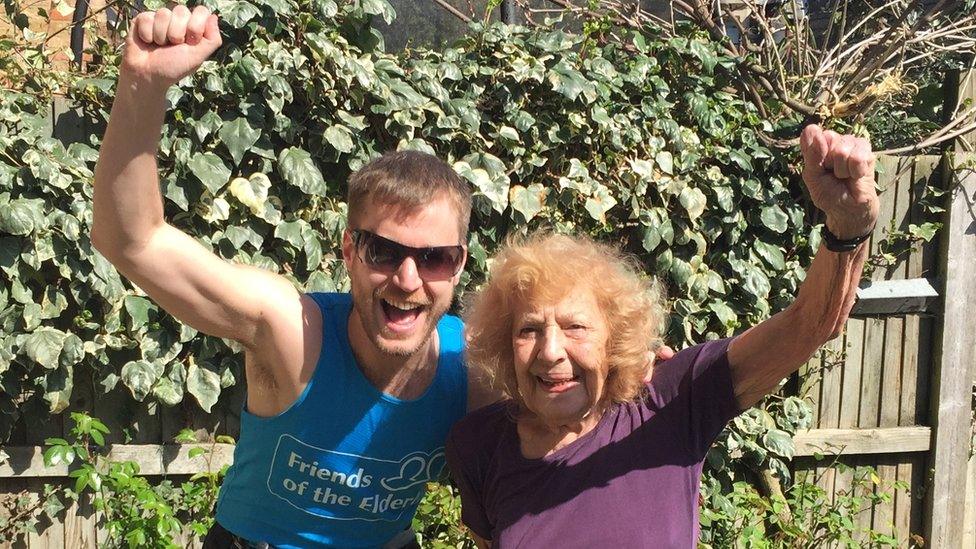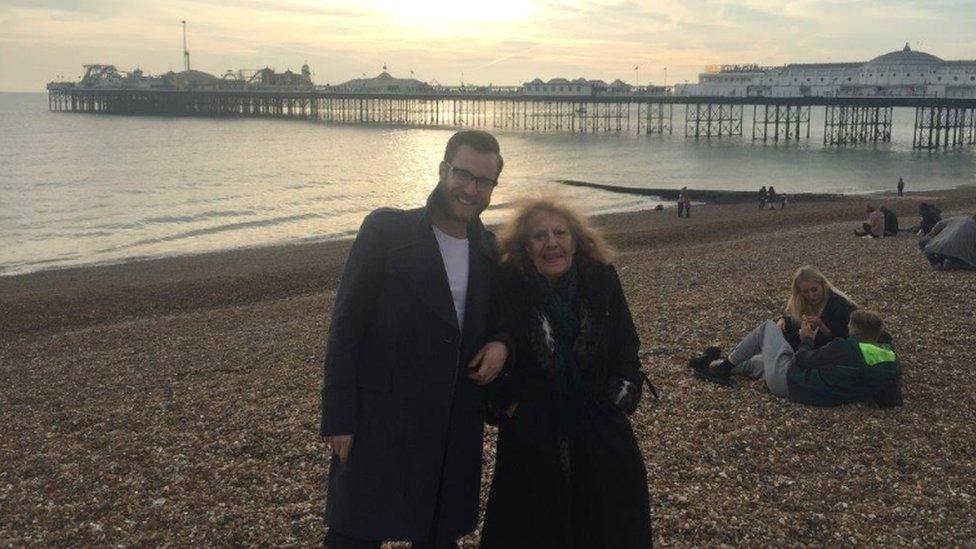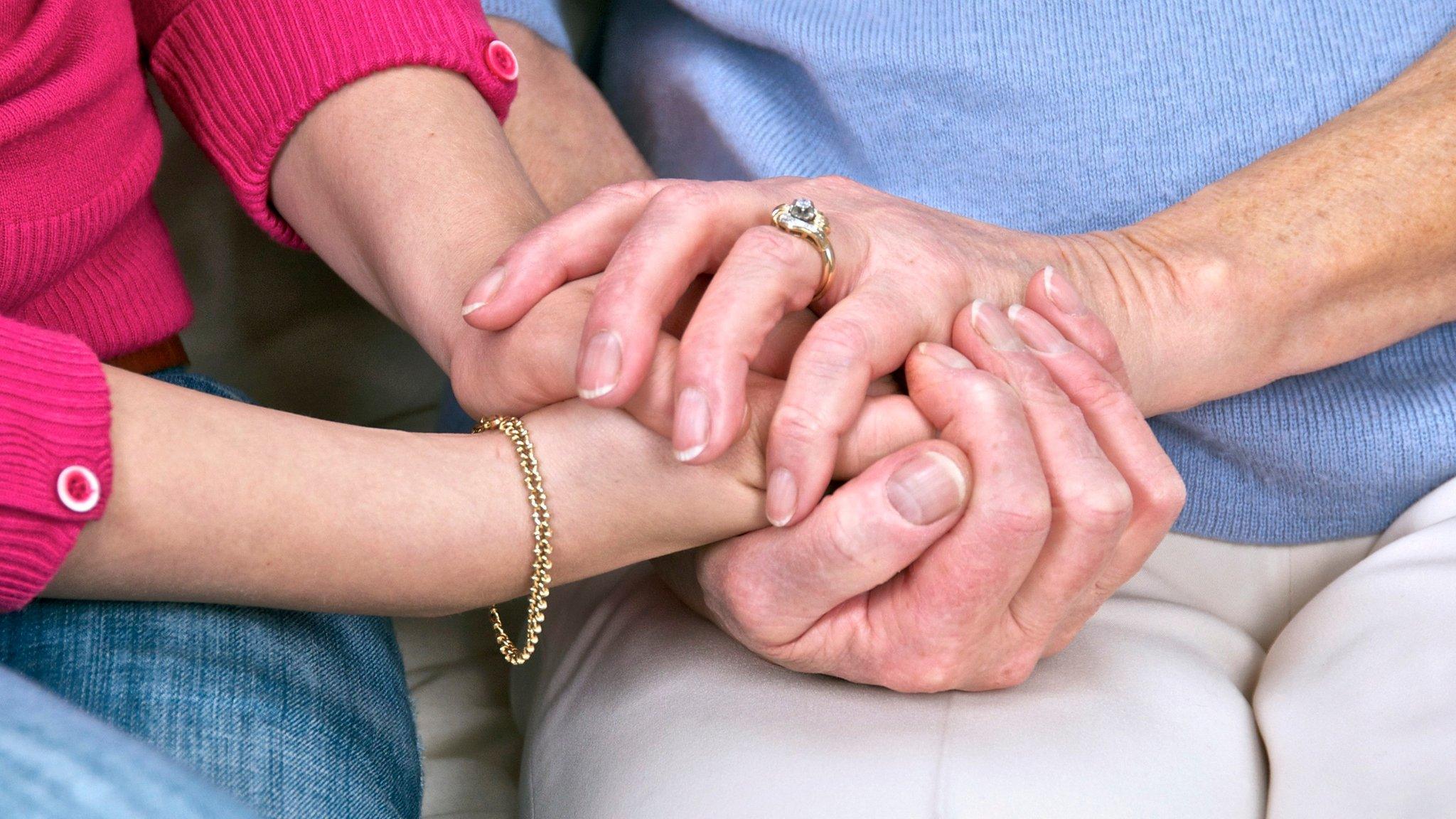My old pal: Friendships fighting off loneliness
- Published

Adam says his friendship with Kyla is one of "the most honest" he has
A study has shed light on the loneliness that many elderly Britons face every day. But unconventional friendships are being formed by some of those trying to redress the balance.
More than a third of people aged 75 and over in the UK experience loneliness that is "out of their control" - equivalent to around 1.8 million people. That's according to a survey by an older people's charity, Independent Age, external, which is making available an advice guide on how to help those affected.
A number of different initiatives are on offer from various charities looking to keep elderly people connected to the outside world.
Befriending schemes can include weekly telephone calls, days out or home visits and often result in unique relationships.
Adam and Kyla

In 2011, Adam Lamb had finished his studies and was searching for somewhere to live in London. Looking to save money, Adam - who was then 26 - went to a home share agency. There he was introduced to Professor Kyla Greenbaum.
"I really liked the idea of developing a friendship with someone that needed it," he explains.
"She was 89 when I moved in. We just hit it off straight away.
"She's got the spirit and imagination of an 18-year-old. She regaled me with stories of what it was like to be a teenager in wartime London."
Soon the trainee solicitor had become Kyla's lodger.
"Together we've been on holiday abroad, been to concerts and done things all over London," he says.
"The friendship is one of the most honest friendships I have. She's like extended family now."
Adam lived with Kyla for four years. He still sees her on a weekly basis and they will be spending Christmas together this year.
Chung and Joan

Chung Ho, a university student in Swansea, has been been chatting to Joan McCormick, who lives in Eastbourne, for three years. The two have never met in person but speak on the phone almost every week.
"It was offered to me and I thought it would be nice to chat to somebody," Joan explains.
The 72-year-old says the age difference doesn't make any difference. "We chat about everything. It takes you out of your environment. It's a special relationship," she says.
"It's so nice to connect to someone you don't know. It's just a lovely friendship."
Chung, aged 24, agrees and says age "doesn't matter" but helps you to see things from "different perspectives".
"It's a sharing experience. You both gain something," he says.
"In university you have to sometimes be alone to study. It's not a great feeling.
"I think it's an extra support for her. When you talk, you feel happy. It's like a supplement."
'Small steps'
Living alone can be a contributing factor to loneliness, and according to the Office for National Statistics, there are more than two million people aged 75 and over living on their own in the UK.
Not all of them are lonely, of course, but feeling lonely can have an impact on your mental and physical health. Research suggests that a lack of social interaction could be as bad for you as smoking 15 cigarettes a day.
Top triggers recorded by the latest survey included people being reminded of someone they miss, being on their own for special occasions, such as Christmas or birthdays, and staying at home due to health issues.
Perhaps unsurprisingly, 41% of people over 75 said they feel lonelier now than they did when they were younger.
Janet Morrison, chief executive of Independent Age, said: "People of all ages feel lonely sometimes, but becoming older shouldn't inevitably mean that you will be lonely.
"It's sad to see that so many older people don't expect feelings of loneliness to go away and think these feelings are out of their control. By taking small steps and changing one thing at a time, it's possible to reduce your feelings of loneliness."
- Published7 January 2016

- Published28 October 2015
